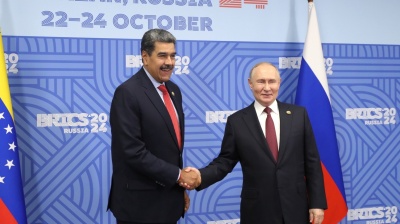US President Donald Trump on January 20 reversed his predecessor Joe Biden's decision to remove Cuba from a list of state sponsors of terrorism, just hours after being sworn in for his second term.
In a widely anticipated step, the White House announced the newly inaugurated president had rescinded Biden's January 14 order that would have lifted Cuba's designation, effectively keeping the communist-ruled island on the terrorism blacklist where Trump had placed it in 2021.
Biden's move last week was part of a prisoner release deal in which Cuba agreed to free 553 people, including opposition leader Daniel Ferrer and others jailed following mass protests in 2021. Cuba had begun releasing prisoners under the agreement negotiated with Vatican involvement.
Cuban President Miguel Diaz-Canel condemned Trump's decision on X, calling it an "act of mockery and abuse" driven by "arrogance and disregard for the truth."
Foreign Minister Bruno Rodríguez echoed his sentiment, stating, “Drunk with arrogance, President Trump decides without reason that Cuba sponsors terrorism. He knows he is lying. He determines to increase the punishment and the economic war against Cuban families."
At his confirmation hearing, incoming Secretary of State Marco Rubio defended the terrorism designation, citing Cuba's alleged support for Colombian guerrilla groups and ties to militant organisations Hamas and Hezbollah. He also claimed Cuba hosts espionage stations for two countries near US shores.
"There is zero doubt in my mind that they meet all the qualifications for being a state sponsor of terrorism," said Rubio, the son of Cuban immigrants opposed to Fidel Castro's 1959 revolution.
The designation severely impedes foreign investment in Cuba, which is already grappling with an economic crisis. The current US terror sponsor list includes only Iran, North Korea, and Syria, with the latter’s status likely to be reviewed in the wake of the fall of the Assad regime.
The move prompted swift international criticism. China's foreign ministry spokesman Guo Jiakun called it a demonstration of US "bullying", while Russian foreign ministry spokeswoman Maria Zakharova said the decision aimed to "further tighten restrictive measures" against Cuba.
It remains unclear whether prisoner releases will continue under Trump's renewed designation. The White House did not specify reasons for rolling back Biden's order or address potential impacts on freed prisoners.
News

Pokrovsk update: Russia controls half the city in a chaotic battle
The battle for Pokrovsk is raging and the Armed Forces of Russia (AFR) have captured half the city, but the situation is very confused. Reports from the city say there is no frontline as the Russians are using a “Brownian motion” tactic.

Singapore introduces new law on caning with harsher penalties to combat scammers
Singapore has passed a new criminal law that mandates caning as part of the punishment for scam-related crimes, following a surge in financial fraud that has cost the nation nearly $4bn over the past six years.

Foreign companies pay Russia $60bn in taxes since Ukraine invasion
Foreign companies in Russia paid at least $20bn in taxes in 2024 alone, and cumulative tax payments since early 2022 exceed $60bn.



_1762193126.jpg)

